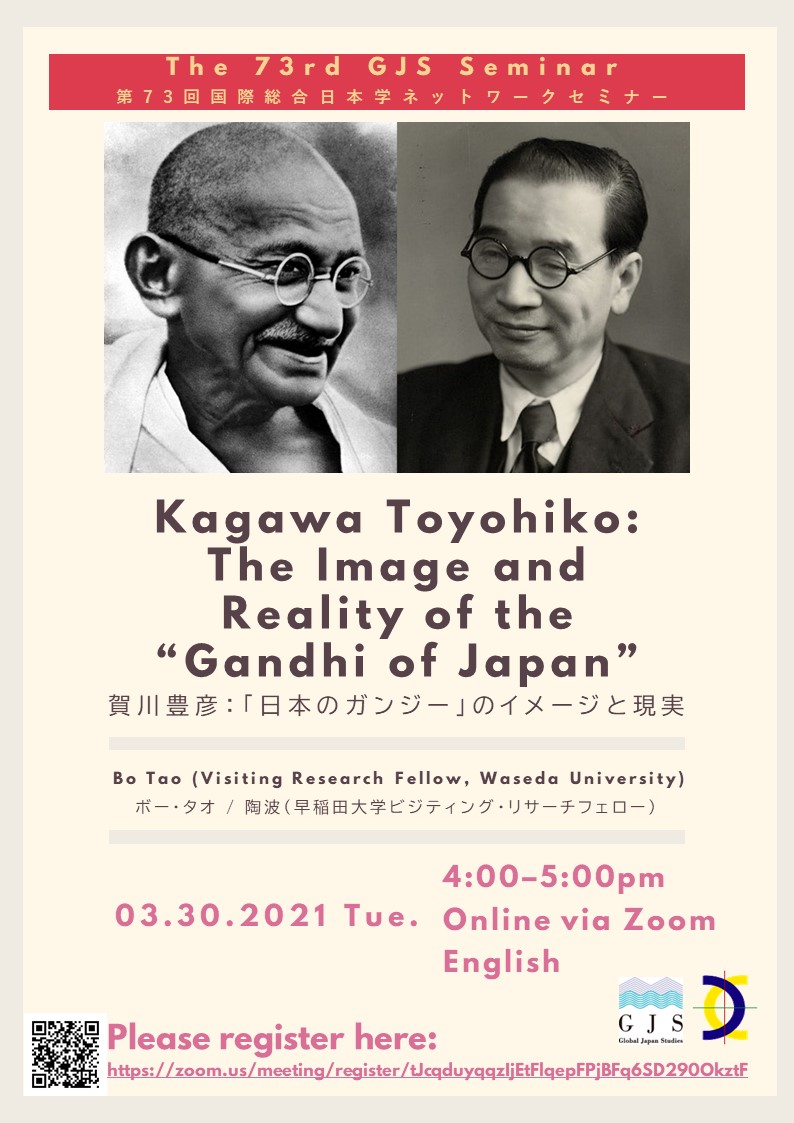Date and time: March 30, 2021 (Tue.), 4:00-5:00PM
Venue: Online via Zoom
※This is an online event with Zoom. Please register here:
https://zoom.us/meeting/register/tJcqduyqqzIjEtFlqepFPjBFq6SD290OkztF
Speaker: Bo Tao (Visiting Research Fellow, Waseda University)
Language: English
Abstract:
Kagawa Toyohiko (1888-1960), who was known as the “Gandhi of Japan,” became the first Japanese person to be nominated for the Nobel Prize in Literature (1947, 1948), as well as the first Japanese nominee for the Nobel Peace Prize in the postwar period (1954, 1955, 1956, 1960), and was one of the foremost internationalists of the twentieth century. Despite the sixty years that have passed since his death, however, a consensus on the impact of his life and legacy is yet to emerge. This is due to a number of reasons, including the disconnect between the scholarship produced from the nationalistic frameworks of Japanese history versus U.S. history—which itself partially stems from a disparity in the awareness of and access to primary sources located on both sides of the Pacific—and the lack of general understanding regarding the transnational networks of cultural and religious exchange that existed at the time. In this presentation, I attempt to reposition Kagawa within a global framework by examining his relationship with Mahatma Gandhi (1869-1948).
「日本のガンジー」の異名を博した宗教活動家である賀川豊彦(1888-1960)は、日本人初のノーベル文学賞候補(1947年、1948年)にノミネートされるとともに、戦後初の日本人ノーベル平和賞候補(1954年-1956年、1960年)となった、20世紀の日本を代表する国際人であった。しかし、彼の死後半世紀以上経った今でも、その業績に対する評価は賛否両論に分かれている。それは、彼に関する研究が日本史とアメリカ史という二つの異なる分野から行われているため、アーカイブ資料の把握や活用が不十分であるということ、そして当時の世界についての認識も従来の分析枠組みにとらわれるあまり、同時代のトランスナショナルな動向に対する理解が不足していることに起因する。この研究報告では、賀川とガンジー(1869-1948)との関係性から、グローバルな文脈の中に賀川を位置付けることを目的とする。
Organizer: Global Japan Studies Network (GJS)
Co-organizer: Institute for Advanced Studies on Asia (IASA)
Contact: gjs[at]ioc.u-tokyo.ac.jp

